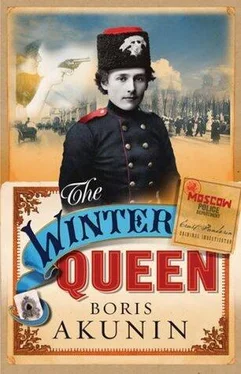Choosing the church in which to celebrate the wedding is an entire science in itself. Thanks be to God, in golden-domed Moscow the choice is extensive, but that merely increases the responsibility of the decision. The genuine old-time Muscovite knows it is good to get married on Sretenka Street, in the Church of the Assumption in Pechatniki, for then husband and wife will share a long life together and die on the same day. The church most auspicious for the generation of numerous offspring is St. Nicholas of the Great Cross, which has extended across an entire city block in the Kitai-Gorod district. Those who prize quiet comfort and domesticity above all else should choose St. Pimen the Great in Starye Vorotniki. If the groom is a military gentleman, who nonetheless does not wish to end his days on the battlefield but close to the home hearth in the bosom of his family, then the wisest thing to do would be to take the marriage vows in the Church of St. George on Vspolie Street. And, of course, no loving mother would ever allow her daughter to marry on Varvarka Street, in the church of the holy martyr Varvara, which would doom the poor soul to a lifetime of torment and suffering.
However, individuals of high birth or rank do not really enjoy much freedom of choice, for their church must be both stately and spacious in order to accommodate a guest list that represents the cream of Moscow society. And "all of Moscow" had indeed gathered at the wedding ceremony that was drawing to its conclusion in the decorous and grandiose Zlatoustinskaya Church. The idle onlookers crowding around the entrance, where the long line of carriages was drawn up, kept pointing out the carriage of the governor-general, Prince Vladimir Andreevich Dolgoruky himself, a sure sign that the wedding celebration was definitely from the very top flight.
Admission to the church had been strictly by personal invitation, but even so the assembled guests numbered as many as two hundred. There were numerous glittering uniforms from the military and the state service; numerous ladies with naked shoulders; numerous tall coiffures, ribbons, decorations, and diamonds. All the chandeliers and candles were lit; the ceremony had been going on for a long time and the guests were tired. All the women, regardless of their age and marital status, were excited and emotional, but the men were clearly languishing as they exchanged remarks about other business in low voices — they had finished discussing the young couple ages ago. The whole of Moscow society knew the father of the bride, Full Privy Counselor Alexander Apollodorovich von Evert-Kolokoltsev, and they had already seen the pretty Elizaveta von Evert-Kolokoltseva at numerous balls, since she had come out the previous season. So curiosity was focused for the main part on the groom, Erast Petrovich Fandorin. Not very much was known about him: a St. Petersburg sort who made flying visits to Moscow on important business; a careerist with close connections to the inner sanctum of state power; not, as yet, of very high rank but still young and climbing the ladder very fast. There were not many people his age sporting the order of St. Vladimir in their buttonholes. Privy Counselor von Evert-Kolokoltsev was clearly a prudent man with an eye to the future.
The women were more taken by the young couple's youth and beauty. The groom was very touchingly agitated, blushing and blanching by turns and stumbling over the words of his vow — in short, he was quite wonderful. And as for the bride, Lizanka Evert-Kolokoltseva, she seemed such a heavenly creature that it quite made one's heart flutter just to look at her. That frothy white dress, that weightless, floating veil, and that wreath of Saxony roses — it was all absolutely perfect. When the bride and groom took a sip of red wine from the chalice and kissed each other, the bride was not overcome by embarrassment. On the contrary, she smiled happily and whispered something to her groom that made him smile, too.
This is what Lizanka whispered to Erast Fandorin. "Poor Liza has decided not to drown herself and to get married instead."
Fandorin had been suffering terribly all day long from the incessant attention and his state of total dependence on the people around him. A great number of old fellow pupils from the gymnasium had turned up, as well as "old friends" of his father (all of whom had vanished without trace during the final year of his life, only to resurface now). First Fandorin had been taken to a bachelor's breakfast at the Prague tavern on Arbat Street, where he had endured being nudged in the side, winked at, and offered condolences on some mysterious misfortune. Then he had been taken back to the hotel, where the barber Pierre had arrived and tugged painfully on his hair as he curled it into a voluptuous pompadour. He was not supposed to see Lizanka until the ceremony, and that was also a torment to him. In the three days since the groom had arrived from St. Petersburg, where he was now employed, he had hardly seen his bride at all. Liza had been busy all the time with important preparations for the wedding.
Then Xavier Feofilaktovich Grushin, bright scarlet after the bachelor's breakfast in his black tailcoat and white best-man's ribbon, had seated the groom in an open carriage and driven him to the church. As Erast Fandorin stood on the steps and waited for the bride, someone had shouted something to him from out of the crowd and one young lady threw a rose at him and it scratched his cheek. Finally they brought Lizanka, who was almost completely invisible behind wave upon wave of transparent material. They stood side by side in front of the lectern, with the choir singing and the priest chanting "For great is God's mercy and love toward man" and then something else. They exchanged rings and stood on the carpet, and then Liza said that phrase about Poor Liza, and Erast Fandorin suddenly relaxed, glanced around, saw the faces and the tall dome of the church, and everything felt good.
It had been good afterward, too, when everyone came up and congratulated them so warmly and sincerely. He had especially liked the governor-general, Prince Vladimir Andreevich Dolgoruky, plump and good-natured, with his round face and drooping mustache. He said he had heard many complimentary things about Fandorin and wished him a happy marriage with all his heart.
Then they went out into the square and everyone there was shouting, but he could not see very much because the sun was shining so brightly.
He and Lizanka got into an open carriage, and suddenly he could smell flowers.
Lizanka removed her long white glove and squeezed Erast Fan-dorin's hand tightly in her own. He stealthily moved his face close to her veil and took a quick breath of the aroma of her hair, her perfume, and her warm skin. At that very moment (they were driving past the Nikitskie Gates) Fandorin's glance happened to fall on the porch of the Church of the Ascension, and it was as if his heart were suddenly clutched by an icy hand.
Fandorin saw two boys about eight or nine years of age, wearing tattered blue uniforms. They were sitting there among the beggars, seeming lost and chanting plaintively in small, shrill voices. The little paupers twisted their necks in curiosity to watch as the glittering wedding procession drove by.
"What's wrong, my love?" Liza asked, frightened at the sudden pallor of her husband's face.
Fandorin did not answer.
A SEARCH OF THE SECRET BASEMENT in the wing of the Astair House had failed to produce anything of interest. A bomb of unknown design had produced a powerful, compact explosion that caused hardly any damage to the building but entirely demolished the subterranean premises. Nothing remained of the archive, nor of Lady Astair herself — unless, that is, one counted a small scrap of silk from a dress.
Deprived of its leader and source of finance, the international network of Astair Houses had collapsed. In some countries the orphanages had been taken over by the state or by charitable societies, but for the most part the institutions had simply closed. In Russia at least, both Astair Houses had been closed on the orders of the Ministry of Public Education as hotbeds of godlessness and pernicious ideas. The teachers had all left and most of the children had simply wandered off.
Читать дальше









